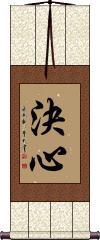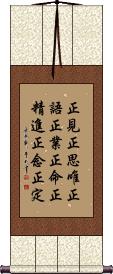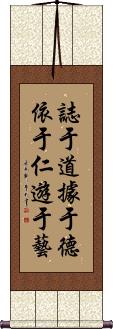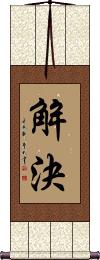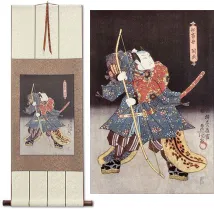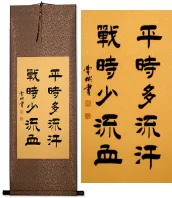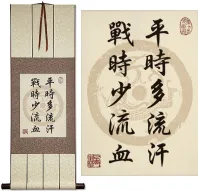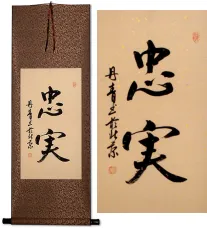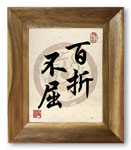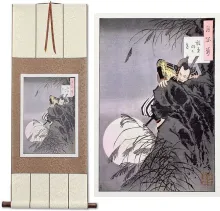Many custom options...
And formats...

Resolve in Chinese / Japanese...
Buy a Resolve calligraphy wall scroll here!
Personalize your custom “Resolve” project by clicking the button next to your favorite “Resolve” title below...
1. 2. Right Resolve / Right Thought / Right Intention / Perfect Resolve
2. Unwavering Determination and Resolve
4. All Tenets of the Noble Eightfold Path
5. The Foundation of Good Conduct
6. Solution
2. Right Resolve / Right Thought / Right Intention / Perfect Resolve
Samyak Samkalpa / Samma Sankappa
正思唯 is one of the Noble Eightfold Paths of Buddhism. Right Thought, along with the Right View, constitute the path to Wisdom.
In Buddhism, Right Thought, in simple terms, means to free yourself from having ill will towards anyone or anything. It also suggests that you remain harmless to other living creatures.
This can also be defined as “Resolve in favor of renunciation, goodwill, and non-harming of sentient beings.”
![]() There is an ancient/alternate version of the third character for this selection. You can see that alternation third character to the right. If you want your selection to use that older character, just click on the character to the right, instead of the button above.
There is an ancient/alternate version of the third character for this selection. You can see that alternation third character to the right. If you want your selection to use that older character, just click on the character to the right, instead of the button above.
Note: This term is exclusively used by devout Buddhists. It is not a common term, and is remains an unknown concept to most Japanese and Chinese people.
See Also: Buddhism | Enlightenment | Noble Eightfold Path
Unwavering Determination and Resolve
This can be translated as unwavering determination, unwavering resolve, or strong determination.
堅定 means unwavering, firm, steady, staunch, and/or resolute.
決心 means determination, resolve, resolution, determined, firm and resolute, or to make up one's mind.
If you want a longer version, 堅定不移的決心 is also a popular phrase with a similar meaning. Contact me if you want that instead.
Determination
決心 is a Chinese, Japanese, and Korean word that holds the dictionary definition of determination but literally means determined heart.
The first character means to determine or determined.
The second character means heart, mind, or soul, so you can imagine that this form of determination partially means putting your heart into something. It can also be translated as resolve, resolution, or decision (as in a decision made and followed).
See Also: Devotion | Tenacious | Passion | Dedication | Will-Power
All Tenets of the Noble Eightfold Path
These are the eight tenets of the Buddhist Noble Eightfold Path written altogether.
Here's this list of tenets in English:
1. Right View / Right Understanding / Right Perspective / Perfect View
2. Right Resolve / Right Thought / Right Intention / Perfect Resolve
3. Right Speech / Right Talk / Perfect Speech
4. Right Action / Perfect Conduct
5. Right Living / Right Livelihood / Perfect Livelihood
6. Right Effort / Right Endeavor / Perfect Effort
7. Right Mindfulness / Right Memory / Perfect Mindfulness
8. Right Concentration / Perfect Concentration
The Foundation of Good Conduct
Quote from Confucius
This proverb, 志于道据于德依于仁游于艺, from the Analects of Confucius translates as:
Resolve yourself in the Dao/Tao/Way.
Rely on Virtue.
Reside in benevolence.
Revel in the arts.
According to Confucius, these are the tenets of good and proper conduct.
This was written over 2500 years ago. The composition is in ancient Chinese grammar and phrasing. A modern Chinese person would need a background in Chinese literature to understand this without the aid of a reference.
Solution
解決 is a way to say “solution” in Chinese, Japanese Kanji, and old Korean Hanja.
解決 can also mean: To settle (a dispute); to resolve; to solve; to dispatch; settlement; or resolution.
This is about resolving or finding a solution to whatever kind of issue or problem might arise.
This in-stock artwork might be what you are looking for, and ships right away...
Gallery Price: $220.00
Your Price: $99.88
Gallery Price: $108.00
Your Price: $59.88
Gallery Price: $90.00
Your Price: $49.88
Gallery Price: $162.00
Your Price: $89.88
Gallery Price: $108.00
Your Price: $59.88
Not the results for resolve that you were looking for?
Below are some entries from our dictionary that may match your resolve search...
| Characters If shown, 2nd row is Simp. Chinese |
Pronunciation Romanization |
Simple Dictionary Definition |
初心 see styles |
chū xīn chu1 xin1 ch`u hsin chu hsin shoshin しょしん |
More info & calligraphy: Mind of the Beginner(1) one's original intention; one's initial enthusiasm; (n,adj-no,adj-na) (2) inexperience; naivety; greenness; (female given name) Ubu The initial resolve or mind of the novice. |
解決 解决 see styles |
jiě jué jie3 jue2 chieh chüeh kaiketsu かいけつ |
More info & calligraphy: Solution(n,vs,vt,vi) settlement; solution; resolution to explain |
志 see styles |
zhì zhi4 chih kokorozashi こころざし |
aspiration; ambition; the will (1) will; resolution; intention; ambition; aim; goal; (2) kindness; goodwill; kind offer; (3) gift (as a token of gratitude); (female given name) Yuki Will, resolve, 志意; 心志; also data, records. |
願 愿 see styles |
yuàn yuan4 yüan gan がん |
(bound form) wish; hope; desire; to be willing; to wish (that something may happen); may ...; vow; pledge prayer; wish; vow; (female given name) Nozomi praṇihita; praṇidhāna; resolve, will, desire, cf. 誓. |
三心 see styles |
sān xīn san1 xin1 san hsin sanshin さんしん |
(given name) Sanshin The three minds, or hearts; various groups are given: (1) Three assured ways of reaching the Pure Land, by (a) 至誠心 perfect sincerity; (b) 深 profound resolve for it; (c) 廻向接發願心 resolve on demitting one's merits to others. (2) (a) 根本心 The 8th or ālaya-vijñāna mind, the storehouse, or source of all seeds of good or evil; (b) 依本 the 7th or mano-vijñāna mind, the mediating cause of all taint; (c) 起事心 the ṣaḍāyatana-vijñāna mind, the immediate influence of the six senses. (3) (a) 入心 (b) 住心 (c) 出心 The mind entering into a condition, staying there, departing. (4) A pure, a single, and an undistracted mind. There are other groups. |
三福 see styles |
sān fú san1 fu2 san fu mifuku みふく |
(place-name, surname) Mifuku The three (sources of) felicity: (1) The 無量壽經 has the felicity of (a) 世福 filial piety, regard for elders, keeping the ten commandments; (b) 戒福 of keeping the other commandments; (c) 行福 of resolve on complete bodhi and the pursuit of the Buddha-way. (2) The 倶舍論 18, has the blessedness of (a) 施類福 almsgiving, in evoking resultant wealth; (b) 戒類福 observance of the 性戒 (against killing, stealing, adultery, lying) and the 遮戒 (against alcohol, etc.), in obtaining a happy lot in the heavens; (c) 修類福 observance of meditation in obtaining final escape from the mortal round. Cf. 三種淨業. |
了卻 了却 see styles |
liǎo què liao3 que4 liao ch`üeh liao chüeh |
to resolve; to settle |
五悔 see styles |
wǔ huǐ wu3 hui3 wu hui gokai |
The five stages in a penitential service. Tiantai gives: (1) confession of past sins and forbidding them for the future; (2) appeal to the universal Buddhas to keep the law-wheel rolling; (3) rejoicing over the good in self and others; (4) 廻向 offering all one's goodness to all the living and to the Buddha-way; (5) resolve, or vows, i. e. the 四弘誓. The Shingon sect 眞言宗 divides the ten great vows of Samantabhadra 普賢 into five 悔, the first three vows being included under 歸命 or submission; the fourth is repentance; the fifth rejoicing; the sixth, seventh, and eighth appeal to the Buddhas; the ninth and tenth, bestowal of acquired merit. |
五轉 五转 see styles |
wǔ zhuǎn wu3 zhuan3 wu chuan goten |
The five evolutions, or developments; (1) resolve on Buddhahood; (2) observance of the rules; (3) attainment of enlightenment; (4) of nirvana; (5) of power to aid others according to need. |
五食 see styles |
wǔ shí wu3 shi2 wu shih gojiki |
The five kinds of spiritual food by which roots of goodness are nourished: correct thoughts; delight in the Law; pleasure in meditation; firm resolve, or vows of self-control; and deliverance from the karma of illusion. |
作意 see styles |
zuò yì zuo4 yi4 tso i sakui さくい |
idea; design; motif; conception; intention cittotpāda; to have the thought arise, be aroused, beget the resolve, etc. |
决疑 see styles |
jué yí jue2 yi2 chüeh i ketsugi |
To resolve doubts, doubts solved: definite. |
分解 see styles |
fēn jiě fen1 jie3 fen chieh bunkai ぶんかい |
to resolve; to decompose; to break down (n,vs,vt,vi) (1) disassembly; dismantling; disaggregating; taking apart; breaking up; analysis; parsing; (n,vs,vt,vi) (2) {chem} decomposition; resolution; disintegration; degradation; (noun, transitive verb) (3) {math} factorization analysis |
分辨 see styles |
fēn biàn fen1 bian4 fen pien |
to distinguish; to differentiate; to resolve |
化解 see styles |
huà jiě hua4 jie3 hua chieh |
to dissolve; to resolve (contradictions); to dispel (doubts); to iron out (difficulties); to defuse (conflicts); to neutralize (fears) |
十住 see styles |
shí zhù shi2 zhu4 shih chu jū jū |
The ten stages, or periods, in bodhisattva-wisdom, prajñā 般若, are the 十住; the merits or character attained are the 十地 q.v. Two interpretations may be given. In the first of these, the first four stages are likened to entry into the holy womb, the next four to the period of gestation, the ninth to birth, and the tenth to the washing or baptism with the water of wisdom, e.g. the baptism of a Kṣatriya prince. The ten stages are (1) 發心住 the purposive stage, the mind set upon Buddhahood; (2) 治地住 clear understanding and mental control; (3) 修行住 unhampered liberty in every direction; (4) 生貴住 acquiring the Tathāgata nature or seed; (5) 方便具足住 perfect adaptability and resemblance in self-development and development of others; (6) 正心住 the whole mind becoming Buddha-like; (7) 不退住 no retrogression, perfect unity and constant progress; (8) 童眞住 as a Buddha-son now complete; (9) 法王子住 as prince of the law; (10) 灌頂住 baptism as such, e.g. the consecration of kings. Another interpretation of the above is: (1) spiritual resolve, stage of śrota-āpanna; (2) submission to rule, preparation for Sakṛdāgāmin stage; (3) cultivation of virtue, attainment of Sakṛdāgāmin stage; (4) noble birth, preparation for the anāgāmin stage; (5) perfect means, attainment of anāgāmin stage; (6) right mind, preparation for arhatship; (7) no-retrogradation, the attainment of arhatship; (8) immortal youth, pratyekabuddhahood; (9) son of the law-king, the conception of bodhisattvahood; (10) baptism as the summit of attainment, the conception of Buddhahood. |
十心 see styles |
shí xīn shi2 xin1 shih hsin jisshin |
The ten kinds of heart or mind; there are three groups. One is from the 止觀 4, minds ignorant and dark; affected by evil companions; not following the good; doing evil in thought, word, deed; spreading evil abroad; unceasingly wicked; secret sin; open crime; utterly shameless; denying cause and effect (retribution)―all such must remain in the flow 流 of reincarnation. The second group (from the same book) is the 逆流 the mind striving against the stream of perpetual reincarnation; it shows itself in devout faith, shame (for sin), fear (of wrong-doing), repentance and confession, reform, bodhi (i.e. the bodhisattva mind), doing good, maintaining the right law, thinking on all the Buddhas, meditation on the void (or, the unreality of sin). The third is the 眞言 group from the 大日經疏 3; the "seed" heart (i.e. the original good desire), the sprout (under Buddhist religious influence), the bud, leaf, flower, fruit, its serviceableness; the child-heart, the discriminating heart, the heart of settled judgment (or resolve). |
十恩 see styles |
shí ēn shi2 en1 shih en jūon |
Ten kinds of the Buddha's grace: his (1) initial resolve to universalize (his salvation); (2) self-sacrifice (in previous lives); (3) complete altruism; (4) his descent into all the six states of existence for their salvation; (5) relief of the living from distress and mortality; (6) profound pity; (7) revelation of himself in human and glorified form; (8) teaching in accordance with the capacity of his hearers, first hīnayāna, then māhayāna doctrine; (9) revealing his nirvāṇa to stimulate his disciples; (10) pitying thought for all creatures, in that dying at 80 instead of at 100 he left twenty years of his own happiness to his disciples; and also the tripiṭaka for universal salvation. |
安慧 see styles |
ān huì an1 hui4 an hui anne あんね |
(female given name) Anne Settled or firm resolve on wisdom; established wisdom; tr. of 悉耻羅末底 Sthiramati, or Sthitamati, one of the ten great exponents of the 唯識論 Vijñaptimātratāsiddhi śāstra, a native of southern India. |
定力 see styles |
dìng lì ding4 li4 ting li jouriki / joriki じょうりき |
ability to concentrate; willpower; resolve (place-name) Jōriki samādhibala. The power of abstract or ecstatic meditation, ability to overcome all disturbing thoughts, the fourth of the five bāla 五力; described also as 攝心 powers of mind-control. |
心願 心愿 see styles |
xīn yuàn xin1 yuan4 hsin yüan shingan しんがん |
cherished desire; dream; craving; wish; aspiration prayer; heartfelt wish The will of the mind, resolve, vow. |
志氣 志气 see styles |
zhì qì zhi4 qi4 chih ch`i chih chi shiki しき |
ambition; resolve; backbone; drive; spirit (surname) Shiki |
期す see styles |
gosu ごす |
(vs-c,vi) (1) (See 期する・ごする・2) to expect; to hope for; to look forward to; to foresee; to anticipate; (vs-c,vi) (2) (See 期する・ごする・3) to resolve (to do); to decide upon; to prepare for; to promise; to pledge |
析疑 see styles |
xī yí xi1 yi2 hsi i |
to resolve a doubt |
決定 决定 see styles |
jué dìng jue2 ding4 chüeh ting kettei / kette けってい |
to decide (to do something); to resolve; decision; CL:個|个[ge4],項|项[xiang4]; certainly (n,vs,vt,vi) decision; determination decidedly |
決疑 决疑 see styles |
jué yí jue2 yi2 chüeh i ketsugi |
to resolve doubt |
決行 see styles |
kekkou / kekko けっこう |
(noun, transitive verb) doing (with resolve); carrying out (e.g. a plan) |
爭氣 争气 see styles |
zhēng qì zheng1 qi4 cheng ch`i cheng chi |
to work hard for something; to resolve on improvement; determined not to fall short |
狠心 see styles |
hěn xīn hen3 xin1 hen hsin |
callous; heartless; to resolve (to do something); firm resolve (as in 下狠心[xia4 hen3xin1]) |
發心 发心 see styles |
fā xīn fa1 xin1 fa hsin hosshin |
Mental initiation or initiative, resolve, make up the mind to; to start out for bodhi, or perfect enlightenment; to show kindness of heart, give alms. |
Click here for more resolve results from our dictionary
The following table may be helpful for those studying Chinese or Japanese...
| Title | Characters | Romaji (Romanized Japanese) | Various forms of Romanized Chinese | |
| 2. Right Resolve Right Thought Right Intention Perfect Resolve | 正思唯 | sei shi yui seishiyui | zhèng sī wéi zheng4 si1 wei2 zheng si wei zhengsiwei | cheng ssu wei chengssuwei |
| Unwavering Determination and Resolve | 堅定決心 坚定决心 | jiān dìng jué xīn jian1 ding4 jue2 xin1 jian ding jue xin jiandingjuexin | chien ting chüeh hsin chientingchüehhsin |
|
| Determination | 決心 决心 | kesshin / keshin | jué xīn / jue2 xin1 / jue xin / juexin | chüeh hsin / chüehhsin |
| All Tenets of the Noble Eightfold Path | 正見正思唯正語正業正命正精進正念正定 正见正思唯正语正业正命正精进正念正定 | shouken shoushiyui shougo shougo shoumyou shoushoujin shounen shoujou shoken shoshiyui shogo shogo shomyo shoshojin shonen shojo | zhèng jiàn zhèng sī wéi zhèng yǔ zhèng yè zhèng mìng zhèng jīng jìn zhèng niàn zhèng dìng zheng4 jian4 zheng4 si1 wei2 zheng4 yu3 zheng4 ye4 zheng4 ming4 zheng4 jing1 jin4 zheng4 nian4 zheng4 ding4 zheng jian zheng si wei zheng yu zheng ye zheng ming zheng jing jin zheng nian zheng ding | cheng chien cheng ssu wei cheng yü cheng yeh cheng ming cheng ching chin cheng nien cheng ting |
| The Foundation of Good Conduct | 誌于道據于德依于仁遊于藝 志于道据于德依于仁游于艺 | zhì yú dào jù yú dé yī yú rén yóu yú yì zhi4 yu2 dao4 ju4 yu2 de2 yi1 yu2 ren2 you2 yu2 yi4 zhi yu dao ju yu de yi yu ren you yu yi | chih yü tao chü yü te i yü jen yu yü i | |
| Solution | 解決 解决 | geketsu | jiě jué / jie3 jue2 / jie jue / jiejue | chieh chüeh / chiehchüeh |
| In some entries above you will see that characters have different versions above and below a line. In these cases, the characters above the line are Traditional Chinese, while the ones below are Simplified Chinese. | ||||
Successful Chinese Character and Japanese Kanji calligraphy searches within the last few hours...


